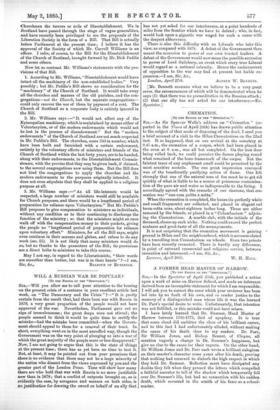WILL A RUSSIAN WAR BE POPULAR? (To THE EDITOR OF
THE "SPECTATOR." I you allow me to call your attention to the bearing -on the present crisis of a sentence in your excellent article last week, on "The Democracy and the Crisis " ?—" It is pretty certain from the result that, had there been war with Russia in 1878, a very great proportion of the people would not have approved of the war. Nevertheless, Parliament gave out no sign of tremulousness ; the great deeps were not stirred ; the people seemed to think it would be quite time to rectify the mistake—had the mistake been committed—when the Government should appeal to them for a renewal of their trust. In short, everything went on in the most unruffled way, though the Government was on the very point of plunging us into a war of which the great majority of the people more or less disapproved." Now, I am not going to argue that this is the state of things at the present time; there has as yet been no time to test it. Bat, at least, it may be pointed out from your premisses that there is no evidence that there may not be a large minority of the nation who dissent from the views expressed by you and the greater part of the London Press. Time will show how many there are who hold that war with Russia is no more justifiable now than in 1878; that a conflict of outposts brought on, as is .evidently the case, by arrogance and menace on both sides, is no justification for drawing the sword on behalf of an ally that
has not yet asked for our interference, at a point hundreds of miles from the frontier which we have to defend ; who, in fact, would look upon a gigantic war waged for such a cause with the deepest abhorrence.
There is also this difficulty with us Liberals who take this view, as compared with 1878. A defeat of the Government then meant the accession to power of our own trusted leaders. A defeat of the Government would now mean the possible accession to power of Lord Salisbury, an event which every true Liberal would regard as a national calamity. Hence the undercurrent of opposition to the war may find at present but feeble expression.—I am, Sir, &c., London, April 27th. ALFRED W. BENNETT.
[Mr. Bennett assumes what we believe to be a very great error, the erroneousness of which will be demonstrated when he says (1) that there was no premeditation in the Russian attack ; (2) that our ally has not asked for our interference.—En. Spectator.]


































 Previous page
Previous page